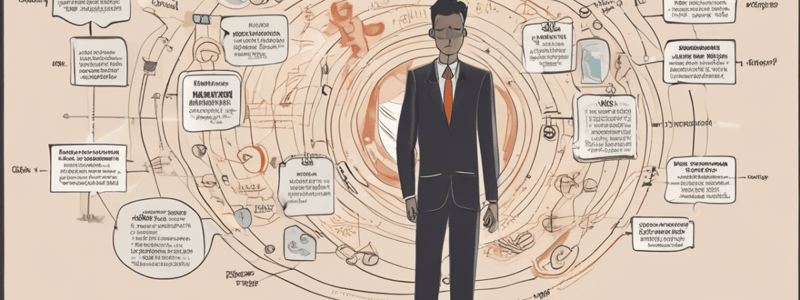Podcast
Questions and Answers
What is the primary role of management in large organisations?
What is the primary role of management in large organisations?
- To influence the lives of thousands of people
- To depend on certain big companies for employment
- To achieve stated organisational goals as productively as possible (correct)
- To maximise profits
What are the two aspects of planning in management?
What are the two aspects of planning in management?
- Organising and motivating
- Leading and controlling
- Controlling and motivating
- Conscious deliberation and visualisation, and creating a plan (correct)
What is the main purpose of planning in management?
What is the main purpose of planning in management?
- To maximise profits
- To determine the organisation's mission and goals (correct)
- To control resources
- To motivate employees
What does organising in management involve?
What does organising in management involve?
What is the importance of matching the organisational structure to the company's needs?
What is the importance of matching the organisational structure to the company's needs?
What do large companies have influence over?
What do large companies have influence over?
What is the end result of the process of management?
What is the end result of the process of management?
Who are the authors that consider planning to be the management function that determines the organisation's mission and goals?
Who are the authors that consider planning to be the management function that determines the organisation's mission and goals?
What is the primary concern of first-line managers?
What is the primary concern of first-line managers?
Which function of management involves the acquisition and maintenance of all employees and personnel?
Which function of management involves the acquisition and maintenance of all employees and personnel?
What percentage of time do top managers spend on planning and organising?
What percentage of time do top managers spend on planning and organising?
What type of skills do managers need to think about the entire organisation holistically?
What type of skills do managers need to think about the entire organisation holistically?
What is the main responsibility of the Operations Manager?
What is the main responsibility of the Operations Manager?
Who is an example of an administrative manager?
Who is an example of an administrative manager?
What is the main difference between top managers and first-line managers?
What is the main difference between top managers and first-line managers?
What type of skills do managers need to interact with people?
What type of skills do managers need to interact with people?
What is the main role of Research and Development?
What is the main role of Research and Development?
Which function of management involves the acquisition, use, and control of the organisation's money?
Which function of management involves the acquisition, use, and control of the organisation's money?
What is the primary focus of top management?
What is the primary focus of top management?
What is the main responsibility of middle management?
What is the main responsibility of middle management?
What is the role of management according to Peter Drucker?
What is the role of management according to Peter Drucker?
What is the result of a business according to the passage?
What is the result of a business according to the passage?
What are the resources at the disposal of management?
What are the resources at the disposal of management?
What is the link between top and lower levels of the organisation?
What is the link between top and lower levels of the organisation?
What are the functional areas of management that middle management splits into?
What are the functional areas of management that middle management splits into?
What is controlling in the management process?
What is controlling in the management process?
What is the single most important thing to remember in management?
What is the single most important thing to remember in management?
What is the primary concern of lower or first-line management?
What is the primary concern of lower or first-line management?
Flashcards are hidden until you start studying
Study Notes
Introduction to Management
- Large companies have a significant influence on people's lives and nations' economies, and their management requires specific skills.
- Management is essential in both profit and non-profit organizations, including universities.
Definition of Management
- Management is the process of planning, organizing, leading, and controlling resources to achieve organizational goals efficiently.
- Planning involves deliberate consideration of what the business should achieve and creating a plan to reach those objectives.
- Organizing involves developing a framework to deploy people and resources to achieve goals.
- Leading involves motivating and directing employees to achieve plans and goals.
- Controlling involves checking and evaluating results to ensure plans are being met and goals are attained.
Resources in Management
- Human resources (personnel)
- Financial resources
- Physical resources (plant and machinery)
- Information resources (computer systems)
What is Management?
- Management is about human beings and their joint performance.
- Its task is to make people capable of joint performance, making their strengths effective, and their weaknesses irrelevant.
- Management deals with the integration of people in a common venture and is deeply embedded in culture.
Types of Management
- Classified by level:
- Top Management (Board of Directors, CEO, Managing Director)
- Middle Management (department heads, implementing policies and plans)
- Lower/First-line Management (operational management, supervising employees)
- Classified by function:
- Marketing
- Human Resource Management
- Finance
- Operations
- Research and Development
- Purchasing
- Administrative Management (general management)
Time Spent on Functional Activities
- The amount of time spent on planning, organizing, leading, and controlling differs according to the level of management.
- Top managers spend more time on planning and organizing, while lower managers spend more time on leading and controlling.
The 10 Roles of Managers
- Every manager must perform certain roles and skills, regardless of their specialty or level, to fulfill their responsibilities.
Managerial Skills Required at Different Levels
- Conceptual skills (thinking ability, strategic thinking)
- Interpersonal skills (interacting with people, resolving conflicts, motivating groups)
- Technical skills (specialized skills, performing tasks)
- The importance of each skill varies depending on the level of management.
Studying That Suits You
Use AI to generate personalized quizzes and flashcards to suit your learning preferences.




